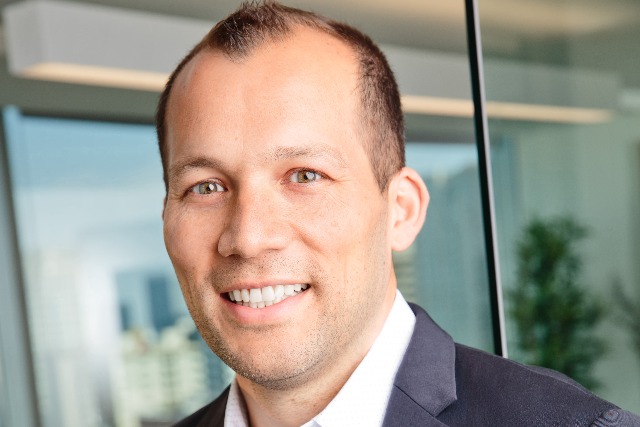.png?width=352&name=Untitled%20design%20(22).png)
7 minute read
Get To Know Steno’s Co-Founder And Chief Executive Officer
Steno was founded by a trial attorney, a computer engineer, and an experienced entrepreneur in September of 2018. This Q&A introduces you to the entrepreneur of that three-person equation, our Chief Executive Officer Greg Hong. You’ll learn what inspired Greg to break into a new industry, tackle an antiquated system and modernize the way thousands of attorneys work.
Before Steno, Greg was the Co-Founder and CEO of Reserve, a restaurant technology company. He led Reserve to secure $45 million from investors before being acquired by Resy and then American Express. He has more than 18 years of experience building new companies from the ground up.

Steno CEO and Co-Founder Greg Hong
Why did you create Steno? What problem does it solve?
Our Co-Founder Dylan Ruga was Reserve’s trademark attorney. We were working together on that project when he approached me looking for feedback on a pitch for a court reporting agency designed with the needs of the attorney in mind.
Dylan has been a trial lawyer for 15 years, and through his own experience, he identified a true need in the market. As a plaintiff’s attorney, one of his most significant expenses for every case is court reporting. Until a case settles out of court or a judge issues a verdict in the trial, that expense is not reimbursed.
The average plaintiff’s attorney spends about two years working on a case from start to finish. As delays occur in the litigation process, the financial impacts can be huge.
Attorneys are constantly trying to maximize their available cash flow. When an attorney takes on a new client, they leverage their cash assets to build their case. They foot the bill and pay for court reporting services upfront.
If a case doesn’t resolve quickly, everything they invested can get tied up into the case itself, limiting their potential to invest in new clients or their firm’s growth.
Dylan’s idea was to disrupt this broken litigation financing model and create a solution that would free up attorney’s cash flow by deferring payment for court reporting services until a case is resolved.
But the benefit of this idea goes beyond an available cash issue. When attorneys have a finite amount to invest in their client’s cases, they are less likely to win.
The U.S. Department of Justice Office for Access to Justice was established in March 2010 to help the justice system efficiently deliver outcomes that are fair and accessible to all, regardless of wealth or status. The office was founded on three guiding principles, one which closely aligns with our motivation for creating Steno: Delivering fair and just outcomes for all parties, including those facing financial and other disadvantages.
Plaintiff's attorneys often represent individual clients in personal injury and employment lawsuits. They’re facing Goliath defendants backed by wealthy insurance companies, with way more resources at their disposal.
In Steno, I saw a huge opportunity to improve attorney’s litigation financing problems while increasing access to justice for their clients. That’s when I asked Dylan to let me take the lead, and he agreed.
In the vast legal technology industry, why court reporting?
Today, law graduates are digital natives, aware that technology can simplify their work and solve obstacles they’re facing in the litigation process. Additionally, the legal technology industry is experiencing record growth. With that comes attention from investors, entrepreneurs, and many new products and services in the market.
There is no shortage of tools available to firms to improve the way legal services are delivered. Even with all this innovation, we noticed that court reporting technology was lagging.
Attorneys have no other option than to pay a lot for the essential court reporting services they need to win cases. They pay agencies a lot of money but get very little support or customer service in return.
We built Steno on a simple idea: that the cost of court reporting shouldn’t be an obstacle to win a case. Something so essential shouldn’t be so challenging to navigate. For our clients, it’s not.
What makes Steno the best court reporting agency?
We offer a deferred payment process called DelayPay.
Plaintiff’s attorneys are taking calculated risks on the cases they pursue. They stand to lose a lot more than money if they invest in a weak case; their reputation and their firm’s track record are both on the line.
Another thing that sets us apart is our commitment to creating a court reporting agency attorneys and court reporters want to work with. When you call us, a human who wants to help is on the other end of the line.
Steno is structured to benefit our clients. This starts with dedicated account managers for every attorney and firm we work with. They answer your call, text, or email quickly, and they solve your problem. We call it “concierge service,” and that’s what we’re striving for.
Tracking metrics like the percent of client inquiries that get replied to in less than one hour, currently almost 98% of inquiries, keeps the entire team accountable and working toward offering the best customer support out there.
Lastly, no other agency has a videoconferencing platform explicitly built for remote depositions. They are all relying on Zoom and a mix of out-of-date software.
This creates a patchwork solution including multiple screens, countless open tabs, and clunky downloads. It’s hard enough to present a strong case in person; when you’re doing it remotely, technology shouldn’t make it more difficult.
Steno Connect knocks Zoom out of the water with built-in exhibit handling and the ability to customize your view in the most logical layout. We have a Steno moderator attend every session in person, and we provide customized training on behalf of the taking attorney, for every participant, before the real thing.
What advice would you offer to someone interested in launching a startup?
Launching Steno was easy compared to some of the other projects I've worked on in the past. I believe it was seamless because we had a clear idea of our target customer. We never had to guess if something would work for them because one of our founders represents that audience, so we would just ask him.
Once we started to grow, feedback from customers became an essential part of our daily operations. We constantly ask for feedback, positive or negative, and use that to inform our strategy moving forward.
This helped us develop a deep understanding of whom we were making our product and customizing our services for. Because our buyer persona was rock solid, a lot of the unknowns that come along with starting a business were not an issue for us.
My best advice would be to make sure you can easily answer these three questions:
- What problem am I solving for my customer?
- How does my product or service bring value to their life or work?
- Do I have a product someone would be willing to pay money for?
These answers will play a key role in defining your core purpose and values that ultimately make up your organization’s core ideology. For Steno, our core purpose is to improve the litigation process. The values that inform how we improve litigation are:
- Be highly reliable.
- Constantly innovate.
- Operate with a hospitality mindset.
We landed on these values by asking our target audience members, attorneys, and court reporters, what was important to them when choosing to work with a court reporting agency.
Simon Sinek has a great TED Talk where he gives two quotes that I always share with our team. “People don’t buy what you do; they buy why you do it,” and “The goal is to do business with people who believe what you believe.”
What’s next for Steno?
We’ve hit our stride, and we have an offering in both technology and financing that is resonating with our audience. Attorneys are some of the most rational buyers out there. They want to be presented with the facts and make their spending decisions based on their client and their firm’s benefit.
We are expanding our national footprint and hiring team members in new locations beyond California, Florida, Nevada, New York, and Texas. We’re also working on building awareness for what we have to offer.
We want to grow to reach as many attorneys as possible, so they can experience the innovations that our current customers are experiencing.
There's room for improvement in every aspect of the litigation process, and Steno already has a team of dedicated people changing the way our customers see court reporting. We will continue to leverage their collective wisdom and existing relationships to grow our business and find unique solutions to our customer’s problems.
In the next five years, we plan to establish a new industry standard of excellence, develop a presence in every major U.S. market, and become the largest provider of legal support services and litigation financing in the U.S.
Even as we grow, we want attorneys and court reporters to feel the same personal connection every time they interact with Steno. We will never sacrifice the quality of our customer service for quantity.
Get the latest from The Brief directly in your inbox
Greg is the Co-Founder and Chief Executive Officer at Steno where he leads the executive team, serves as liaison to the board of directors and sets the course of the company’s strategy. Greg knows his unique experience in finance, product and operations helps when assessing business-decision impacts across an organization.
AVAILABLE NATIONWIDE
The court reporting you need. The service you deserve.

Recommended for you:
.png?width=352&name=Untitled%20design%20(22).png)

Steno Appoints Prabhdeep Singh as COO To Lead Next Phase of Growth
Steno is delighted to announce the appointment of Prabhdeep Singh to the position of Chief...
Read Blog Post
Steno Employees Retreat to Los Angeles for Company Culture Building and Collaboration
Since Steno offers full-time and part-time remote jobs across the United States, it can be...
Read Blog Post




.png)


